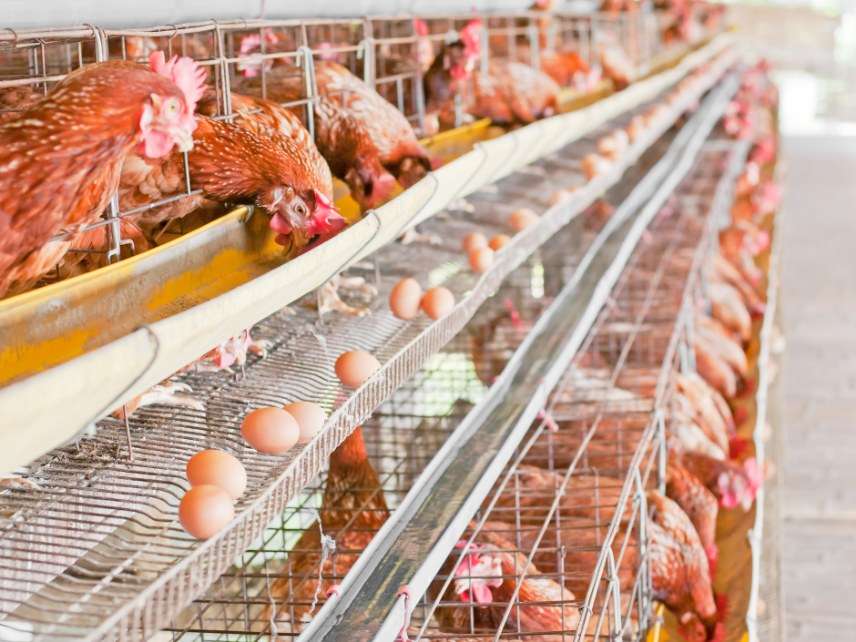Unconstitutional State Food, Agriculture Crackdowns Spur Congress to Act
States like Massachusetts attempt to control how farms outside their borders operate.

Earlier this summer, Rep. James Sensenbrenner (R-Calif. Wisc.) introduced a bill that could dramatically change the ways states tax and regulate interstate commerce, including commerce in agriculture and food.
The bill, known as the No Regulation Without Representation Act of 2017, would bar states from regulating or taxing many businesses that don't physically operate within their borders.
The bill is intended to rein in "certain State impositions on interstate commerce." It declares "a State may tax or regulate a person's activity in interstate commerce only when such person is physically present in the State during the period in which the tax or regulation is imposed."
But wait. Doesn't the Constitution already prohibit states from regulating interstate commerce, via the Commerce Clause (and its corollary, the dormant Commerce Clause) and the Fourteenth Amendment? You bet! But states increasingly ignore those edicts.
Take Massachusetts, where voters in November adopted Question 3. The law, which won't take effect for at least a couple years, bans "the sale of eggs, veal, or pork of a farm animal confined in spaces that prevent the animal from lying down, standing up, extending its limbs, or turning around." The law applies not just to farms in Massachusetts but also to "farms located in other states," notes one recent report.
As I wrote last year, the law "impose[s] unwise, harmful, costly, and unconstitutional standards for raising a host of livestock animals." Though the Massachusetts law imposes the same restrictions on businesses in every other state that it imposes on businesses in Massachusetts, that doesn't make the law fair. It makes it unconstitutional.
"The state may well be allowed to regulate many facets of agriculture within its borders," I wrote last year. "But it has no such authority to regulate the way livestock is raised in other states."
The bill introduced by Rep. Sensenbrenner is a direct threat to the Massachusetts law. While Massachusetts voters clearly erred in choosing to adopt this unconstitutional law, they're not alone. California voters adopted a similar law earlier this decade.
Both states' laws, which I discuss together here, are just the sort of unconstitutional laws Rep. Sensenbrenner's bill is intended to eradicate. Indeed, it appears the origins of Rep. Sensenbrenner's bill stem directly from battles like these over food and agriculture.
"[The new bill] is likely related to a fight between states that has been progressing through the courts," reads a good National Law Review analysis of the bill, which compares it to a narrower Sensenbrenner bill that stalled last year. "California has a law that requires eggs sold in California to be laid by hens in cages that are of a specific size. Missouri and other states sued to invalidate California's law, but lost in the 9th Circuit and certiorari was denied by the US Supreme Court on May 30, 2017."
Unsurprisingly, the bill has strong supporters and vehement detractors.
Animal-rights and animal-welfare groups are in the latter camp.
"We're all for neutering pets," Paul Shapiro, vice president for policy engagement with the Humane Society of the United States, told me by email this week, "but we don't know why Mr. Sensenbrenner wants to neuter the states and strip their ability to protect their own citizens."
The National Conference of State Legislatures (NCSL), a bi-partisan group that represents state lawmakers across the country, says the bill is "one of the most coercive, intrusive, and preemptive legislature measures ever introduced in Congress."
The National Governor's Association, which also opposes the bill, issued a joint statement with the NCSL saying the measure would hinder states' power to tax.
But many conservative, libertarian, and business groups support the bill.
Overstock.com, helmed by libertarian CEO Patrick Byrne, says the bill would limit unfair and burdensome taxation by states. Hamilton Davison, head of the American Catalog Mailers Association, which also supports the measure, says the state laws the bill is intended to negate "contradict Supreme Court precedent… and disproportionately harm smaller businesses with limited means."
Americans for Tax Reform head Grover Norquist says the bill would "reign[] in government overreach by forbidding any state from 1) imposing a sales tax on businesses physically outside the boundaries of the state, and 2) prohibits any state from exporting regulations onto businesses in other states." The R Street Institute says "[p]assage of this bill would codify important Constitutional protections on behalf of consumers, taxpayers, and small businesses."
Proponents of animal agriculture also support the bill.
"No state has the right to tell the citizens of another state they can not sell a product to that state[']s citizens," says the nonprofit Protect the Harvest, in a statement emailed to me this week. "These laws being introduced do not protect the welfare of the animals they seemingly are trying to protect. They are to eliminate the use of animals in agriculture period."
In its letter to Congress, the NCSL concludes "it is the prerogative, no, it is the obligation of states to remind Congress that there are 50 stars on the American flag, not 535," the latter figure referring to the number of Members of Congress.
That is undoubtedly true. But until states like Massachusetts and California stop overstepping their constitutional authority—by passing, to turn the NCSL's overheated rhetoric against it, "coercive, intrusive, and preemptive" laws—they can expect Congress will flex its muscle in response.


Show Comments (44)